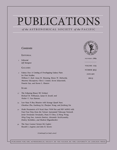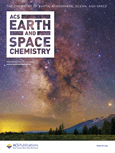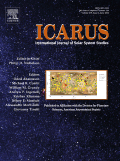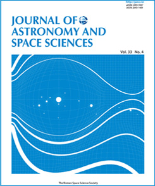
Earth and Planetary Physics
metrics 2024
Connecting Global Scholars in Earth and Planetary Physics
Introduction
Earth and Planetary Physics, published by SCIENCE PRESS, is a distinguished open-access journal that has been a vital resource for the scientific community since its inception in 2017. With both ISSN and E-ISSN 2096-3955, this journal contributes significantly to the fields of Astronomy and Astrophysics, Atmospheric Science, and Space and Planetary Science, consistently holding a Q2 quartile ranking across these categories as of 2023. Based in the United States, its editorial board consists of renowned experts dedicated to advancing the understanding of planetary phenomena and Earth processes. The journal prides itself on its rigorous peer-review process and broad readership, facilitating the dissemination of cutting-edge research and innovative methodologies. This commitment is reflected in its strong Scopus rankings, positioning it competitively within its scope—rank #33 in Astronomy and Astrophysics and rank #40 in Space and Planetary Science. As an open-access journal, Earth and Planetary Physics is committed to providing free and global access to high-quality research, thereby enhancing visibility and impact for its authors while catering to researchers, professionals, and students eager to explore the intricacies of our planet and beyond.
Metrics 2024
 0.67
0.67 2.50
2.50 2.60
2.60 22
22Metrics History
Rank 2024
Scopus
IF (Web Of Science)
JCI (Web Of Science)
Quartile History
Similar Journals

Frontiers in Astronomy and Space Sciences
Pioneering Insights into the Depths of AstronomyFrontiers in Astronomy and Space Sciences is a leading open access journal published by FRONTIERS MEDIA SA, based in Switzerland. Since its inception in 2015, this journal has provided a dynamic platform for researchers, professionals, and students to disseminate their findings across a wide spectrum of topics within the field of astronomy and astrophysics. With an impressive 2023 Impact Factor reflecting its relevance and contribution to the scientific community, it ranks in the Q2 category in Astronomy and Astrophysics, demonstrating a solid reputation among peers. The journal's commitment to open access ensures that all published research is freely available, fostering greater collaboration and knowledge sharing among astronomers worldwide. With a diverse range of articles spanning from theoretical investigations to observational studies, Frontiers in Astronomy and Space Sciences is an essential resource for anyone seeking to explore the wonders of the universe and share innovative ideas that push the boundaries of our understanding.

PUBLICATIONS OF THE ASTRONOMICAL SOCIETY OF THE PACIFIC
Charting New Territories in Astronomy and BeyondPublications of the Astronomical Society of the Pacific is a prestigious journal dedicated to advancing the fields of Astronomy and Astrophysics, as well as Space and Planetary Science. Published by IOP Publishing Ltd, this influential journal plays a critical role in disseminating groundbreaking research and innovative findings. With an impressive Q1 ranking in both related categories according to the 2023 metrics, it is recognized among the top journals in its field. As a vital resource for researchers, professionals, and students alike, the journal covers a range of topics relevant to current astronomical research from 1996 to 2024. Although it does not offer open access options, the journal is highly regarded in academic circles, evidenced by its competitive ranking in Scopus—20th in Astronomy and Astrophysics and 26th in Space and Planetary Science. This commitment to excellence ensures that it remains an essential platform for sharing the latest insights in the ever-evolving universe.

EARTH AND PLANETARY SCIENCE LETTERS
Catalyzing Knowledge in Earth and Space SciencesEARTH AND PLANETARY SCIENCE LETTERS, published by ELSEVIER, stands as a premier academic journal in the fields of Earth and Planetary Sciences, Geochemistry and Petrology, Geophysics, and Space and Planetary Science. Since its inception in 1966 and continuing to 2024, the journal has consistently maintained an impressive reputation, ranking in the top quartile (Q1) across several categories, highlighting its vital role in advancing scholarly research. With a Scopus ranking of #4 in both Geophysics and Geochemistry and Petrology, and a notable 97th percentile in multiple Earth sciences categories, EARTH AND PLANETARY SCIENCE LETTERS provides a platform for groundbreaking research, encouraging rigorous investigation and dissemination of knowledge. While not available as an Open Access publication, the journal remains highly accessible to academics and professionals worldwide, providing invaluable insights and fostering discussions that influence the future of Earth sciences. Whether you are a researcher, educator, or student, this journal is a crucial resource for understanding our planet and its processes.

ACS Earth and Space Chemistry
Advancing Knowledge at the Intersection of Earth and SpaceACS Earth and Space Chemistry is a leading journal published by the American Chemical Society, dedicated to advancing the interdisciplinary fields of atmospheric science, geochemistry, and planetary science. Since its inception in 2017, this journal has quickly established itself as a pivotal resource for researchers and professionals, boasting an impressive impact factor and securing its position in Q2 of the Scopus rankings for 2023 across its relevant categories. The journal publishes cutting-edge research articles, reviews, and commentaries that explore the chemical processes influencing Earth and space environments. By providing open access to invaluable research from experts around the globe, it encourages collaboration and dissemination of knowledge, crucial for addressing pressing environmental and planetary challenges. Situated in the heart of Washington, D.C., the journal's editorial office works diligently to ensure rigorous peer review and high-quality publications that meet the needs of its diverse audience, including scholars and students keen to stay abreast of developments in these dynamic fields.

ICARUS
Advancing the Frontiers of Space and Planetary Science.ICARUS is a prominent peer-reviewed journal dedicated to advancing knowledge in the realm of Astronomy and Astrophysics, as well as Space and Planetary Science. Published by Academic Press Inc, Elsevier Science, this esteemed journal has been contributing to the scientific discourse since 1962 and will continue to do so well into 2024. With an impressive impact factor placing it in the Q2 quartile, ICARUS ranks among the top journals in its field, standing appropriately at #22 out of 90 in Astronomy and Astrophysics and #27 out of 104 in Space and Planetary Science according to Scopus metrics. Researchers, professionals, and students alike benefit from its comprehensive scope, which encompasses a wide array of topics related to planetary processes, space exploration, and astrophysical phenomena. Although it does not currently offer open access, the journal remains a critical resource for scholars seeking to disseminate their findings and engage with cutting-edge research in the exciting fields of astronomy and planetary science.

GEOMAGNETISM AND AERONOMY
Advancing Knowledge in Geophysics and Planetary ScienceGEOMAGNETISM AND AERONOMY, published by MAIK NAUKA/INTERPERIODICA/SPRINGER, is a prominent journal dedicated to advancing the fields of geophysics and planetary science. With ISSN 0016-7932 and E-ISSN 1555-645X, this journal serves as a critical platform for researchers to disseminate their findings on geomagnetic phenomena and aeronomical studies, fostering a deeper understanding of Earth's magnetic field dynamics and atmospheric interactions. Spanning publishing years from 1996 to 2024, it is categorized in the Q3 quartile for geophysics and Q4 for space and planetary science, reflecting its positioning within the academic landscape. Although not open access, readers and researchers can access valuable insights into geomagnetic and atmospheric research, contributing to ongoing discourse in these vital scientific domains. With a focus on innovative research, GEOMAGNETISM AND AERONOMY remains an essential resource for professionals and students aiming to deepen their expertise in Earth and planetary sciences.

Journal of Asian Earth Sciences-X
Fostering Collaboration for Sustainable Earth SolutionsJournal of Asian Earth Sciences-X, a distinguished publication by ELSEVIER, is at the forefront of Earth and planetary sciences, particularly focusing on the dynamic fields of geology and earth-surface processes. As an Open Access journal since 2019, it provides unparalleled access to high-quality research, fostering global collaboration and dissemination of knowledge. With an impressive impact factor and ranking in the Q2 category for both Earth-Surface Processes and Geology, it serves as a crucial platform for researchers, professionals, and students alike to share their findings and insights. Situated in the United Kingdom, the journal thrives on contributions that enhance our understanding of Asian geosciences within a broader global context, aiming to tackle major challenges such as climate change and natural resource management. By bridging regional studies with global perspectives, the Journal of Asian Earth Sciences-X is not only a vital resource for academia but also supports sustainable development initiatives across the region.

SOLAR SYSTEM RESEARCH
Unveiling the Secrets of Celestial BodiesSOLAR SYSTEM RESEARCH, published by Pleides Publishing Inc, offers a comprehensive platform for the exploration and dissemination of scientific knowledge in the fields of Astronomy, Astrophysics, and Space and Planetary Science. With its origins tracing back to 1969, this journal provides a vital resource for researchers and professionals seeking to deepen their understanding of the solar system's complexities, including planetary formation, extraterrestrial geology, and the dynamics of celestial bodies. Although categorized in the Q4 quartile for both relevant disciplines, SOLAR SYSTEM RESEARCH remains committed to publishing high-quality research that contributes to advancing contemporary scientific discourse. Dedicated to fostering collaboration and innovation, the journal is indexed in Scopus and adheres to rigorous academic standards, making it an essential resource for students and professionals alike pursuing the latest developments in solar system studies.

Earth and Space Science
Advancing Knowledge in Planetary and Environmental Sciences.Earth and Space Science, published by the American Geophysical Union, is a distinguished open-access journal that has profoundly impacted the realms of earth and planetary sciences as well as environmental science since its inception in 2014. With impressive rankings, including Q1 in both Earth and Planetary Sciences and Environmental Science for 2023, this journal ranks 38th out of 195 in the general Earth and planetary sciences category and 51st out of 219 in environmental science, showcasing its commitment to high-quality research dissemination. The journal serves as a vital platform for researchers, professionals, and students, fostering the exploration of critical topics and advancements within these pivotal fields. With an accessible format, researchers can benefit from the rich content available, furthering their knowledge and ensuring that groundbreaking discoveries reach a broader audience. The journal's ongoing commitment to open access aligns with contemporary trends in scholarly communication, emphasizing inclusion and collaboration in tackling pressing global challenges.

Journal of Astronomy and Space Sciences
Fostering Collaboration for a Deeper Cosmic Insight.The Journal of Astronomy and Space Sciences, published by the Korean Space Science Society, is a premier open-access platform dedicated to advancing the fields of astronomy, astrophysics, and space sciences. Established in 1984, the journal has been instrumental in disseminating high-quality research findings, fostering collaboration among scientists globally, and providing insights into the dynamics of our universe. With an ISSN of 2093-5587 and an E-ISSN of 2093-1409, the journal has gained notable recognition, currently ranking in the Q3 quartile in Earth and Planetary Sciences and Physics and Astronomy as of 2023. Although the journal's H-Index is currently unspecified, its commitment to rigorous peer-review processes and open-access availability ensures that groundbreaking research is accessible to a wide audience. Based in Seoul, South Korea, the journal is poised to continue supporting innovative research through 2024 and beyond. Researchers, professionals, and students alike will find valuable resources and opportunities within its pages, further establishing this journal as a crucial resource in the exploration of the cosmos.